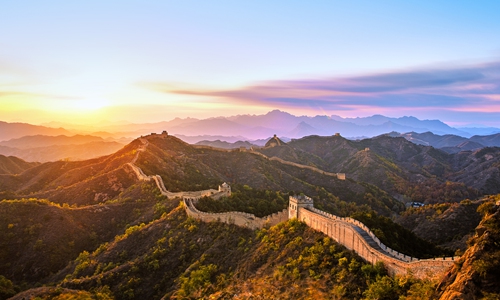Why China stays strong in face of 'scold war' by West
By Xu Qinduo Source: Global Times Published: 2020/8/17 12:15:32

Photo: VCG
Since the COVID-19 pandemic swept across the rich Western world in March, China has been on the receiving end of criticism and attacks - in particular from Washington.
Following the enactment of the national security law for Hong Kong, most English-speaking countries, led by the US, have done nothing but escalate tensions.
Despite these, China has risen above the mud-slinging and will turn out to be the only major economy to record a positive growth in 2020.
The Chinese system is socialist. As such, during the fight against COVID-19, the Chinese government put people first by shutting down the entire country at a tremendous economic cost. "Saving lives at whatever costs" has been the common practice. The socialist system has strong Chinese characteristics for individual benefits.
Yet under US' aggressive attacks, China's system remains solid with a national consensus. Business is blossoming from the Chinese way of doing things. A World Bank ranking on the ease of doing business noted that the average time taken to set up a business in China is just nine days - as opposed to 23 days back in 2017.
Given the size of the Chinese market of 1.4 billion people with an expanding middle class of 400 million, investors who shun or ignore such a market will do so simply at their own risk, even losses. China is also working to cultivate the country into a massive consumer market. This in turn will only reinforce China's attraction to international businesses.
As a matter of fact, for the first time, according to Fortune magazine, more Fortune Global 500 companies are based in the Chinese mainland and Hong Kong than in the US: 124 vs 121. Add in Taiwan's companies, and the China total jumps to 133.
When the Global 500 list first came out in 1990, there were no Chinese companies on the list, according to the magazine. So the change in the global economy is significant. In a nutshell, China's economy is large and strong enough to absorb many more shocks than people might have imagined.
Inside China, there's a vibrant market of opinions. Constructive criticism on a range of topics and policies are not rare at all. Such scrutiny allows the Chinese government to produce long-term policies which are usually well thought and thoroughly debated. They are fine-tuned policies based on specific conditions.
But current international criticisms belong to a different genre. They are often misplaced or biased misunderstandings. For example, the Xinjiang vocational education and training centers are a typical Chinese way to fight terrorism. Like the Traditional Chinese Medicine or TCM, it emphasizes prevention in a holistic approach. Those who join the training centers are usually enrolled in de-radicalization courses, but they also get to learn the common language of the country in order to get a job with ease. They are taught to read and study laws more closely in order to better follow them. The ultimate goal is to equip them with new skills to truly start a new life in a sustainable way. Unfortunately, Western criticisms over Xinjiang often miss the big picture.
Some of the concerns are sometimes intentionally created and exaggerated by Washington for its own geopolitical interests. The smear campaign against Huawei is a case in point. There's zero proof of the company endangering the national security of any country. No country had an issue with Huawei until Washington threatened and pressured some of them to abandon the best services offered by the company.
Criticism of the national security law for Hong Kong isn't fair either. Many of the critics seem to forget to take into consideration that China resumed the exercise of sovereignty over Hong Kong since 1997 - there's no reason for Beijing not to wish well of the region.
As the US struggles further without much success to deal with the COVID-19 epidemic, the Chinese people anticipate more criticisms from Washington as it tries to scapegoat China. Some of its allies, like members of the Five Eyes alliance, will clearly continue to dance to the tune of the US. But China is likely to remain strong and stand tall. As one article in The Economist has said recently, "since 1995 China's share of world GDP at market prices has risen from 2% to 16%, despite waves of Western skepticism."
China has seen ups and downs over the past several millenniums. Multiple empires have come and gone, but China manages to stay on. There's every reason to believe that the Middle Kingdom will carry on in its own fashion for a long time to come.
The author is a senior journalist and political analyst at China Media Group. opinion@globaltimes.com.cn
Posted in: VIEWPOINT